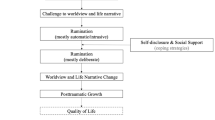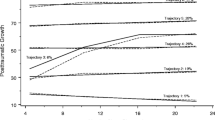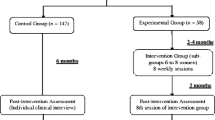Abstract
The purpose of this study was to examine whether social problem solving (SPS) would relate to posttraumatic growth (PTG), particularly new life possibilities in breast cancer survivors. Participants included 85 women who had undergone surgical intervention for breast cancer at least 6 months prior to study participation. Participant ages ranged from 29 to 88 years. The majority of the sample was White (86%), married (58%), and had received at least some postsecondary education (73%), and all participants spoke English. This IRB-approved cross-sectional study was part of a larger study examining psychosocial protective and risk factors in breast cancer survivors at a university-affiliated private hospital. We hypothesized that better SPS ability would relate to PTG new possibilities above and beyond age, annual income, and time since surgery. Results from this study indicate that a positive problem orientation and lack of impulsive/careless problem-solving style appear to play a role in posttraumatic growth among breast cancer survivors, particularly in developing beliefs about one’s ability to positively change one’s life. Given the established benefits of active/approach coping in cancer populations, it makes sense that similar interventions such as problem-solving therapy, a cognitive-behavioral therapy that includes challenging and reframing negative beliefs about self and situation, may promote new possibility beliefs in this population.
Similar content being viewed by others
References
Adler, N. E. & Page, A. E. K. (2008). The psychosocial needs of cancer patients. Institute of Medicine (US) Committee on Psychosocial Services to Cancer Patients/Families in a Community Setting. Cancer Care for the whole patient: Meeting psychosocial health needs. Washington (DC): National Academies Press (US); 2008, 1. Retrieved from https://www.ncbi.nlm.nih.gov/books/NBK4011/.
American Cancer Society (2018). Cancer facts and figures 2018. Retrieved from https://www.cancer.org/content/dam/cancer-org/research/cancer-facts-and-statistics/annual-cancer-facts-and-figures/2018/cancer-facts-and-figures-2018.pdf.
Andrykowski, M. A., Steffens, R. F., Bush, H. M., & Tucker, T. C. (2013). Reports of ‘growth’ in survivors of non-small cell lung cancer and healthy controls: What is the value-added by the cancer experience? Psycho-Oncology, 22(10), 2214–2219.
D’Zurilla, T. J., & Nezu, A. M. (2007). Problem-solving therapy: A positive approach to clinical intervention (3rd ed.). New York: Springer Publishing Co.
D’Zurilla, T. J., Nezu, A. M., & Maydeu-Olivares, A. (2002). Manual for the Social Problem-Solving Inventory-Revised. North Tonawanda: Multi-Health Systems.
Danhauer, S. C., Case, L. D., Tedeschi, R., Russell, G., Vishnevsky, T., Triplett, K., … , & Avis, N. E. (2013). Predictors of posttraumatic growth in women with breast cancer. Psycho-Oncology, 22(12), 2676-2683.
Danhauer, S. C., Russell, G., Case, L. D., Sohl, S. J., Tedeschi, R. G., Addington, E. L., … , & Avis, N. E. (2015). Trajectories of posttraumatic growth and associated characteristics in women with breast cancer. Annals of Behavioral Medicine, 49(5), 650–659.
D’Zurilla, T. J., & Nezu, A. M. (1990). Development and preliminary evaluation of the Social Problem-Solving Inventory. Psychological Assessment: A Journal of Consulting and Clinical Psychology, 2(2), 156–163.
Hefferon, K., Grealy, M., & Mutrie, N. (2010). Post-traumatic growth and life threatening physical illness: A systematic review of the qualitative literature. British Journal of Health Psychology, 14(2), 343–378.
Jim, H. S. L., & Jacobsen, P. B. (2008). Posttraumatic stress and posttraumatic growth in cancer survivorship: A review. The Cancer Journal, 14(6), 414–419.
Koutrouli, N., Anagnostopoulos, F., Griva, F., Gourounti, K., Kolokotroni, F., Efstathiou, V., & Potamianos, G. (2016). Exploring the relationship between posttraumatic growth, cognitive processing, psychological distress, and social constraints in a sample of breast cancer patients. Women & Health, 56, 650–667.
Koutrouli, N., Anagnostopoulos, F., & Potomianos, G. (2012). Posttraumatic stress disorder and posttraumatic growth in breast cancer patients: A systematic review. Women & Health, 52, 503–514.
Lelorain, S., Bonnaud-Antignac, A., & Florin, A. (2010). Long term posttraumatic growth after breast cancer: Prevalence, predictors and relationships with psychological health. Journal of Clinical Psychology in Medical Settings, 17(1), 14–22.
Lelorain, S., Tessier, P., Florin, A., & Bonnaud-Antignac, A. (2012). Posttraumatic growth in long term breast cancer survivors: Relation to coping, social support and cognitive processing. Journal of Health Psychology, 17(5), 627–639.
Maners, A., & Champion, V. L. (2011). Coping and quality of life outcomes in younger breast cancer survivors. Western Journal of Nursing Research, 33(8), 1106–1107.
Morris, B. A., Shakespeare-Finch, J. & Scott, J. L. (2007). Coping processes and dimensions of posttraumatic growth. The Australian Journal of Disaster and Trauma Studies, 11, 1.
Nezu, A. M., Nezu, C. M., & D’Zurilla, T. J. (2013). Problem-solving therapy: A treatment manual. New York: Springer Publishing Co.
Nezu, A. M., Nezu, C. M., Felgoise, S. H., McClure, K. S., & Houts, P. S. (2003). Project Genesis: Assessing the efficacy of problem-solving therapy for distressed adult cancer patients. Journal of Consulting and Clinical Psychology, 71(6), 1036–1048.
Nezu, A. M., Nezu, C. M., Friedman, S. H., Faddis, S., & Houts, P. S. (1998). Helping cancer patients cope: A problem-solving approach. Washington, DC: American Psychological Association.
Raingruber, B. (2011). The effectiveness of psychosocial interventions with cancer patients: An integrative review of the literature (2006–2011). ISRN Nursing, 2011(2011), 638218. https://doi.org/10.5402/2011/638218.
Schand, L. K., Cowlishaw, S., Brooker, J. E., Burney, S., & Ricciardelli, L. A. (2015). Correlates of post-traumatic stress symptoms and growth in cancer patients: A systematic review and meta-analysis. Psycho-Oncology, 24(6), 624–634.
Svetina, M., & Nastran, K. (2012). Family relationships and post-traumatic growth in breast cancer patients. Psychiatria Danubina, 24(3), 298–306.
Taku, K., Cann, A., Calhoun, L. G., & Tedeschi, R. G. (2008). Factor structure of the posttraumatic growth inventory: A comparison of five models using confirmatory factor analysis. Journal of Traumatic Stress, 21, 158–164.
Tedeschi, R. G., & Calhoun, L. G. (1996). The posttraumatic growth inventory: Measuring the positive legacy of trauma. Journal of Traumatic Stress, 9, 455–471.
Tedeschi, R. G., & Calhoun, L. G. (2004). Posttraumatic growth: Conceptual foundations and empirical evidence. Psychological Inquiry, 15(1), 1–18.
Zabora, J., Britzenhofeszog, K., Curbow, B., Hooker, C., & Piantados, S. (2001). The prevalence of psychological distress by cancer site. Psycho-Oncology, 10, 19–28.
Funding
Funding was provided by The Cooper Foundation Pink Roses Teal Magnolias Fund.
Author information
Authors and Affiliations
Corresponding author
Ethics declarations
Conflict of Interest
Elisabeth S. Markman, Kelly S. McClure, Cori E. McMahon, Nataliya Zelikovsky, Brian W. Macone, Anastasia J. Bullock declare that they have no conflict of interest.
Ethical Approval
All procedures performed in studies involving human participants were in accordance with the ethical standards of the institutional research committee (Cooper University Hospital Institutional Review Board, IRB Number: 15-137EX) and with the 1964 Helsinki declaration and its later amendments or comparable ethical standards.
Informed Consent
Informed consent was obtained from all individual participants included in the study.
Additional information
Publisher's Note
Springer Nature remains neutral with regard to jurisdictional claims in published maps and institutional affiliations.
Rights and permissions
About this article
Cite this article
Markman, E.S., McClure, K.S., McMahon, C.E. et al. Social Problem Solving and Posttraumatic Growth New Possibilities in Postoperative Breast Cancer Survivors. J Clin Psychol Med Settings 27, 518–526 (2020). https://doi.org/10.1007/s10880-019-09641-3
Published:
Issue Date:
DOI: https://doi.org/10.1007/s10880-019-09641-3




